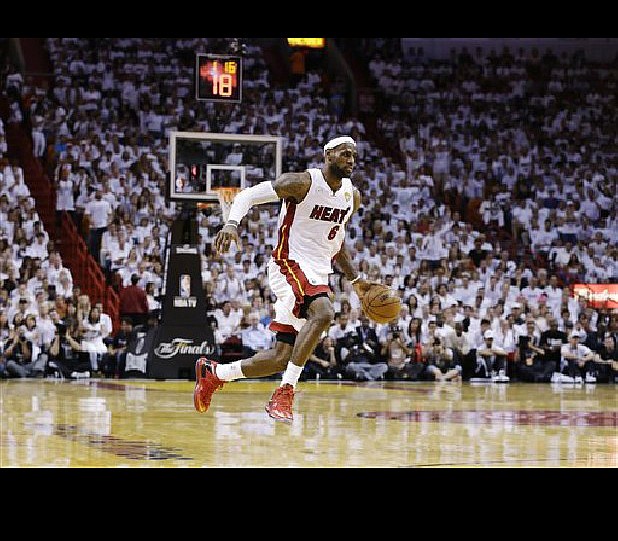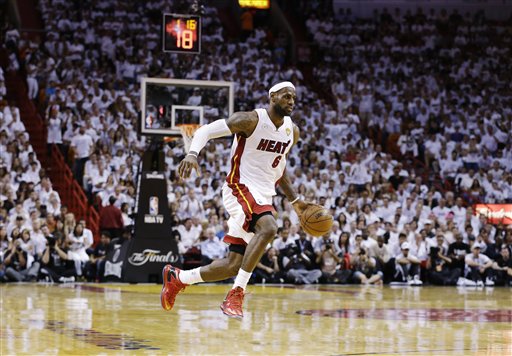LeBron James added another notch in his trophy case, scoring 37 points in a Game 7 win that delivered back-to-back NBA titles to the Miami Heat. It seems like 24 years rather than 24 months when James and the Heat could not corral the Dallas Mavericks in the 2011 Finals, and the sporting world wondered if LeBron was good enough or tough enough or whatever enough to win it all.
A dizzying 12-plus months of two titles, two MVPs, two Finals MVPs and a gold medal has answered almost all of those questions.
Notice the word almost, because there is still one more left: Is LeBron the best ever?
And like the uncertainty of his place before winning the title, it's impossible to know where James ranks on that scale.
It's easy to assume that the LeBron haters will not quiet down. For whatever reason, James has become a lightning rod for a sizable part of the sporting public, a likable guy with amazing gifts that is highly unlikable to thousands if not millions. They have very little to hang their hat on in their anti-LeBron bias -- and if "The Decision" is your biggest anti-LeBron argument, well, get over it -- so LeBron adding his second title will hardly slow the flow.
Even his biggest detractos must respect this moment for the moment it is. James delivered in Game 6 and Game 7. Does it matter that the main feeling is relief for the favored Heat and James? Does it matter that this was expected, and when expectations are met rather than exceeded, the reaction is a good one rather than a jubilant one?
Of course not. But this seems a fair time to gauge where LeBron is.
Here is James' resume: He's 28 years old. He is one of five guys to be a four-time NBA MVP -- Jabbar, Russell, Chamberlain and Jordan are the others, and that's pretty good company. He's one of three guys to be MVP of the league and the finals in the same season more than once -- Jordan and Bird are the others, and that's pretty good company, too. He has two titles. Those are the accomplishments for the trophy case.
But when gauging individual excellence, isn't team success a rather subjective and at times random talking point? Why does the "ring is the thing" criteria change depending on the player?
It's easy to acknowledge the belief that Michael Jordan is the best player ever, but he didn't win as much as Bill Russell. Barry Sanders is accepted as the best running back of his generation, but he was a transcendent talent that languished in team mediocrity. But he also played in the same generation as the game's most statistically accomplished running back who won three titles as the linchpin of a dynasty, yet Emmitt Smith gets no where near the individual love Sanders does.
Yes, surrounding cast plays a part in that. Sanders was surrounded by sheep in Lions clothing; Smith by a slew of fellow Hall of Famers. (Side note: We acknowledge your cohorts are supremely important, yet James gets slammed for leaving a dead-end situation Cleveland. And in truth as great as Jordan was, if his cast had not gotten better -- and the league noticeably worse in the mid-1990s -- and he had not won a title or six, he would be the Dan Marino of basketball.)
Why the double standard? Winning is the ultimate goal, but should it be the ultimate gauge of greatness? And yes quarterback is a different beast, but Terry Bradshaw is in talks as the best QB ever, but in truth how many guys in that era would have been a multiple Super Bowl champ with those super-talented Steelers teams? If Bradshaw had been with the Bengals and Kenny Anderson had been in Pittsburgh, are we talking about Anderson in the same context. How about Joe Montana, who landed in the perfect system with arguably the best coach ever?
As for James' individual skills, those are tougher to compare to his all-time peers and even scarier to image in scope. Jordan was 28 when he won his first title, and MJ's game had started to morph from the greatest air act since a young Doctor J to a ruthless scorer with a deadly mid-range jumper. James is physically superior to almost any basketball superstar ever. He's 6-foot-8, 270 pounds and plays point guard on one-end of the floor and guards everyone from point guards to power forwards on the other. In Game 7, he hit half his 3s, and if LeBron continues to improve as a long-range shooter -- he shot better than 40 percent from 3 this season -- he's almost unguardable.
This championship adds to the collection and the resume, but it does not mean he's the best ever or not the best ever. It's a piece of his legacy, which is still under construction, and while MJ nor Bird nor Magic nor Russell can add anything more to theirs, James still has a hard hat on and is still working.
This much is for sure: James is fun to watch for a variety of reasons, the biggest being he is the most unselfish superstar ever -- almost unselfish to a fault at times. And enjoying that, and the assembly of a career that's going to be in the discussion of the best ever, is more than enough.
For now.
Contact Jay Greeson at jgreeson@timesfreepress.com or at 423-757-6273.

